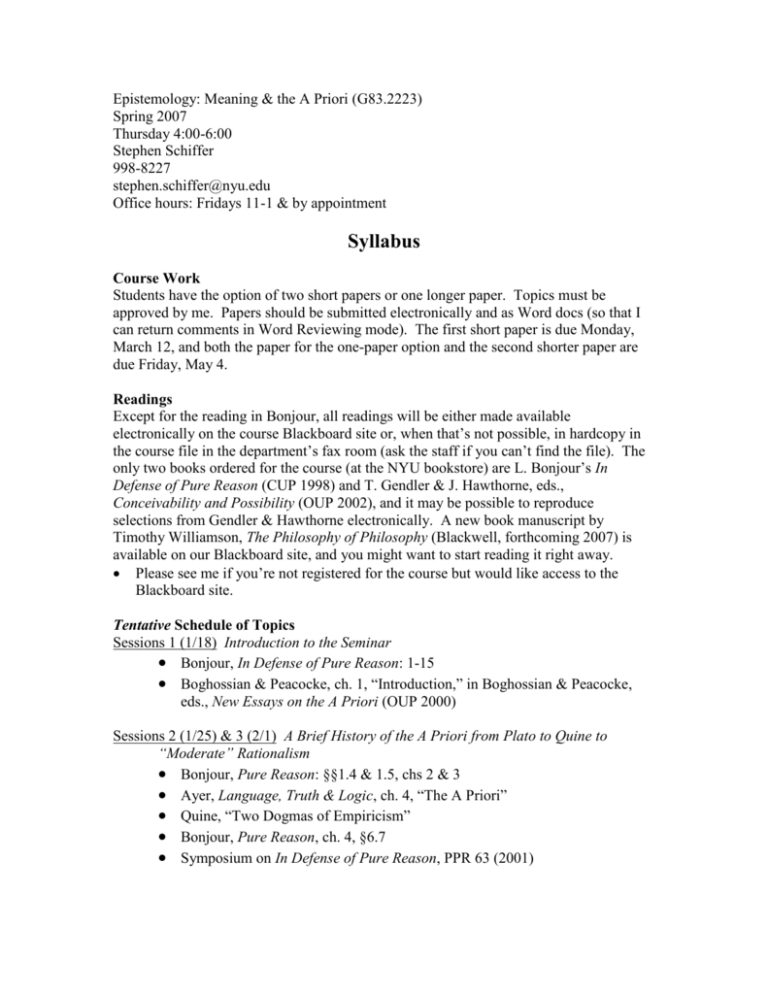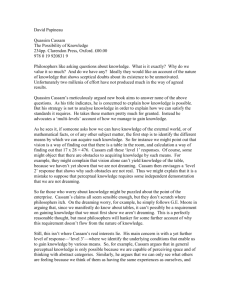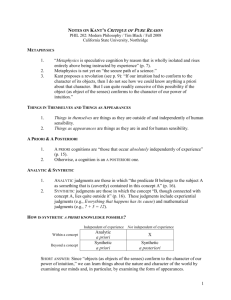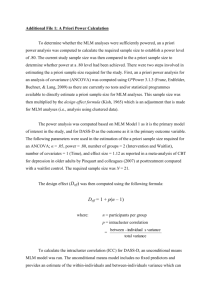Syllabus
advertisement

Epistemology: Meaning & the A Priori (G83.2223) Spring 2007 Thursday 4:00-6:00 Stephen Schiffer 998-8227 stephen.schiffer@nyu.edu Office hours: Fridays 11-1 & by appointment Syllabus Course Work Students have the option of two short papers or one longer paper. Topics must be approved by me. Papers should be submitted electronically and as Word docs (so that I can return comments in Word Reviewing mode). The first short paper is due Monday, March 12, and both the paper for the one-paper option and the second shorter paper are due Friday, May 4. Readings Except for the reading in Bonjour, all readings will be either made available electronically on the course Blackboard site or, when that’s not possible, in hardcopy in the course file in the department’s fax room (ask the staff if you can’t find the file). The only two books ordered for the course (at the NYU bookstore) are L. Bonjour’s In Defense of Pure Reason (CUP 1998) and T. Gendler & J. Hawthorne, eds., Conceivability and Possibility (OUP 2002), and it may be possible to reproduce selections from Gendler & Hawthorne electronically. A new book manuscript by Timothy Williamson, The Philosophy of Philosophy (Blackwell, forthcoming 2007) is available on our Blackboard site, and you might want to start reading it right away. Please see me if you’re not registered for the course but would like access to the Blackboard site. Tentative Schedule of Topics Sessions 1 (1/18) Introduction to the Seminar Bonjour, In Defense of Pure Reason: 1-15 Boghossian & Peacocke, ch. 1, “Introduction,” in Boghossian & Peacocke, eds., New Essays on the A Priori (OUP 2000) Sessions 2 (1/25) & 3 (2/1) A Brief History of the A Priori from Plato to Quine to “Moderate” Rationalism Bonjour, Pure Reason: §§1.4 & 1.5, chs 2 & 3 Ayer, Language, Truth & Logic, ch. 4, “The A Priori” Quine, “Two Dogmas of Empiricism” Bonjour, Pure Reason, ch. 4, §6.7 Symposium on In Defense of Pure Reason, PPR 63 (2001) 2 Bealer, “A Theory of the A Priori,” Pacific Philosophical Quarterly 81 (2000): 1-30 Session 4 (2/8) Field’s Non-Factualist Account of A Priori Justification Field, “Apriority as an Evaluative Notion,” in Boghossian & Peacocke ____, “Recent Debates about the A Priori,” in Gendler & Hawthorne, Oxford Studies in Epistemology (OUP 2005) Sessions 5 (2/15) & 6 (2/22) Peacocke’s Meaning-Based Account of A Priori Justification Peacocke, “How Are A Priori Truths Possible?”, European journal of Philosophy 1 (1993): 175-99 _______, “Implicit Conceptions, Understanding and Rationality,” Philosophical Issues 9 (1998) with responses by Schiffer, Rey, Margolis, Toribio, and replies by Peacocke _______, “Explaining the A Priori: The Programme of Moderate Rationalism,” in Boghossian & Peacocke _______, “The A Priori,” in Jackson & Smith (eds.), The Oxford Handbook of Contemporary Philosophy (OUP 2005) _______, The Realm of Reason (OUP 2004), Introduction & ch. 6, “A Priori Entitlement” Horwich, “Meaning Constitution and Epistemic Rationality,” in Reflections on Meaning (OUP 2006) Sessions 7 (3/1) & 8 (3/8) Boghossian’s Meaning-Based Account of A Priori Justification Boghossian, “Analyticity Reconsidered,” Noûs 30 (1996): 360-91 _________, “Knowledge of Logic,” in Boghossian & Peacocke _________, “How Are Objective Epistemic Reasons Possible?”, Philosophical Studies 106: 1-40 __________, “Blind Reasoning,” Supplement to Proceedings of the Aristotelian Society 77 (2003): 225-48 __________, “Epistemic Analyticity: A Defense,” Grazer Philosophische Studien: 66 (2003): 15-35 Williamson, “Blind Reasoning,” Supplement to Proceedings of the Aristotelian Society 77 (2003): 249-93 Wright, “On Basic Logical Knowledge: Reflections on Paul Boghossian’s ‘How Are Objective Epistemic Reasons Possible?’”, Philosophical Studies 106: 41-85 __________, “Intuition, Entitlement, and the Epistemology of Logical Laws,” Dialectica 58 (2004) Hale & Wright, “Implicit Definition and the A Priori,” in Boghossian & Peacocke Horwich, op. cit. 2 3 Schechter & Enoch, “Meaning and Justification: The Case of Modus Ponens,” Noûs 40 (2006): 687-715. Margolis & Laurence, “Boghossian on Analyticity,” Analysis 61 (2001): 293302 Williamson, The Philosophy of Philosophy, ch. 4. “Epistemological Conceptions of Analyticity” Sessions 9 (3/22), 10 (329), & 11 (4/5) Another Meaning-Based Account of A Priori Justification Schiffer, “Non-Inferential A Priori Justification: Speculations about Meaning and the Structure of Cognition,” forthcoming in Philosophical Issues Williamson, “Conceptual Truth,” Aristotelian Society Supp. Vol. 80 (2006) G. Harman, “The Future of the A Priori,” in Philosophy at the Turn of the Century Sessions 12 (4/12) (to be given by Anna-Sara Malmgren), 13 (4/19), & 14 (4/26) A Priori Justification and Philosophical Methodology Schiffer, “Philosophical Paradoxes,” unpublished talk (2003) Williamson, The Philosophy of Philosophy Malmgren, ch. 2 of unpublished dissertation, "What do we know when we know that Smith doesn't know—and how do we know it?" (2007) E. Sosa, “A Defense of the Use of Intuitions in Philosophy,” in Bishop & Murphy, eds, Stich and His Critics (Blackwell 2005) 3








